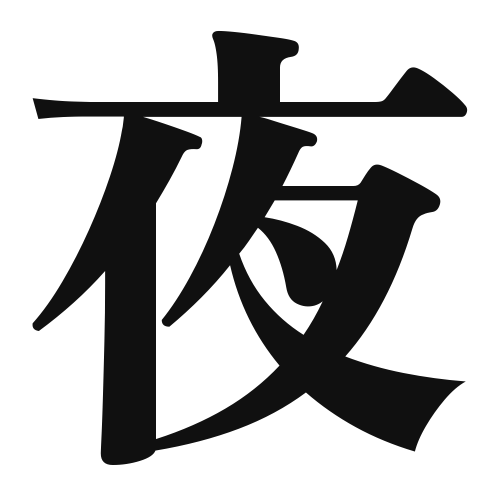1. Overview of Meaning
The kanji “夜” (pronounced “ya”) means “night.” It represents the time of day when it is dark outside, typically after sunset and before sunrise.
2. Formation and Radicals
Formation of the Kanji: The kanji “夜” is a phono-semantic compound, which means it combines both meaning and sound elements. The left part of the character is a radical that relates to the concept of darkness, while the right part contributes to the pronunciation.
Radical: The radical for “夜” is “夕” (evening), which signifies the time when the sun sets, leading into the night.
3. Examples of Usage
Common Words and Phrases:
- 夜空 (よぞら, yozora) – night sky
- 夜食 (やしょく, yashoku) – late-night snack
- 夜明け (よあけ, yoake) – dawn
Example Sentences in Daily Conversation:
- 今夜は星がきれいですね。 (こんやはほしがきれいですね。) – The stars are beautiful tonight.
- 夜遅くまで勉強しました。 (よるおそくまでべんきょうしました。) – I studied late into the night.
4. Synonyms and Antonyms
Similar Kanji:
- 晩 (ばん, ban) – evening; refers to the time just before night.
- 夕 (ゆう, yuu) – evening; often used to describe the time around sunset.
Antonyms:
- 昼 (ひる, hiru) – day; the time when it is light outside, opposite of night.
5. Cultural and Historical Background
Relation to Japanese Culture: The concept of “夜” is deeply embedded in Japanese culture, often associated with various traditions and festivals that take place at night, such as lantern festivals.
Proverbs and Idioms:
- 夜明け前が一番暗い (よあけまえがいちばんくらい) – “The darkest hour is just before dawn.” This proverb emphasizes hope and perseverance during difficult times.
